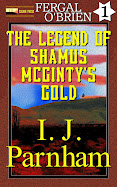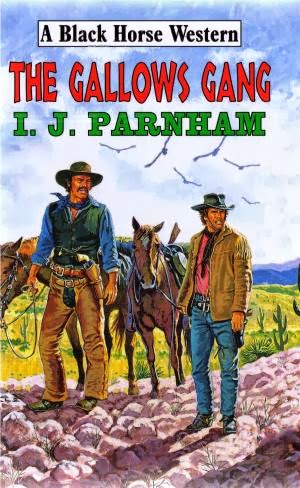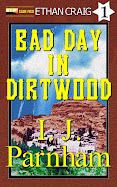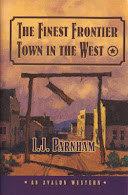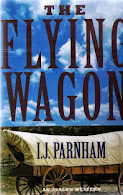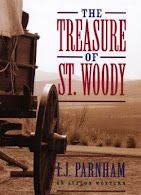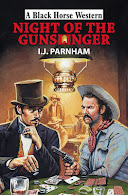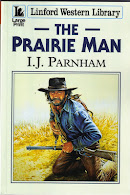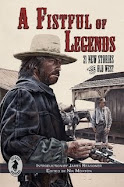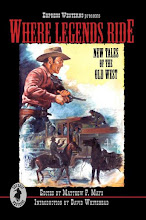Nik Morton's third Black Horse Western (written as Ross Morton)
The $300 Man is published in May and the Linford Western reprint of
Last Chance Saloon is published in August. Nik is also the principal editor for Express Westerns' second anthology.
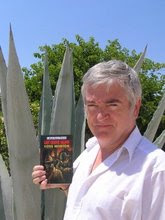 Nik, thanks for agreeing to do this interview. Can you tell us a little about yourself?
Nik, thanks for agreeing to do this interview. Can you tell us a little about yourself?I’d written two spy novels by age 16 (still unpublished but in my possession), which probably explains why I didn’t do well with my GCE O levels! At that time I’d have liked to pursue a career in illustration but didn’t have the required number of GCEs – though my artwork was apparently very good. So I took an office job and eventually gravitated to joining the Royal Navy. Saw the world, in more ways than one, and took a writing correspondence course and started getting a few successes with articles and short stories. This prompted the course organisers to offer me a job as a writing tutor, but my naval career got in the way – I needed to be on the end of a phone, which wasn’t possible in those days.

I sold my first story in 1971. I prefer fiction and read almost all genres – espionage, horror, ghost, western, romance, saga, crime, thriller and fantasy – and have sold stories in all of them, including a confessional ‘I deceived my husband’... As a writer I cannot neglect non-fiction and do enjoy reading a broad variety; I have a large library that covers true adventure, travel, biography, the sciences and notably the Old West. I advocate that to be a writer you have to read – widely.
I’ve ‘retired’ to southern Spain with my wife Jennifer and nearby lives our daughter Hannah, son-in-law Farhad (when he isn’t working in UK) and grandson Darius. I’ve sold cartoons and comic strips and over 70 short stories and many more articles, have edited in house magazines, a sci-fi magazine for 18 issues, and a number of books. I have seven books published or about to be published – two psychic spy thrillers, a crime thriller, three westerns, and a fantasy quest.
You worked as Matthew Mayo's assistant editor on the first Express Westerns anthology Where Legends Ride, how was that experience?
Matthew P. Mayo is a professional through and through. He has a keen eye and ear for writing. Virtually all the proposed changes/edits I advocated went through on his nod; I was particularly pleased that a major amount of improvement on one story was accepted by both the author and Matthew.

Editing isn’t an ego trip and, after all, editors are there to ensure that any writers they present look as good as possible. That, I feel, is Matthew in a nutshell. He gives of himself so other writers can benefit. As I said, like Matthew, I’d had experience at editing over many years – and, let’s be honest, any writer has to be a stern self-editor if the finished manuscript is going to work.
You wrote a rather unusual and original story for the anthology entitled Bubbles. How did that come about?
This story came about long before the anthology was mooted. At the local writers’ circle we were given a theme or word that was intended to inspire us to write for the following week. The word was ‘bubbles’. Where the core idea came from, I don’t recall, but I wanted to echo the word ‘bubbles’ throughout the story in a number of different meanings – and managed it for its 1,700 words. It was well received when I read it out. But by then the characters I’d created seemed to have potential way beyond that paltry wordcount. So I studied the period timeline and within their tale is interwoven a number of significant milestones in the Old West mythos. One reviewer said the story was more of a synopsis for a longer piece. While I don’t agree, believing that the story works as written – including name references to some BHW authors! – I do agree that there is great potential for a longer saga, bigger than a BHW even, though it will entail more research than given so far; one day, maybe.
For Express Westerns' second anthology Matthew stepped aside as principal editor. Did you have to think twice before taking up the offer to be editor this time?
Stepping into Matthew’s shoes… think twice? No, I was honoured to be asked. I know that Matthew has a busy and very rewarding writing schedule which precluded his taking the reins this time. I’ve been editing for a long time, so I feel confident. I appreciate that writing and reading are subjective pursuits, but I’m fairly sure that any suggestions for amendment or rewrite I may make will be taken in the manner intended – that is, to improve the offered piece.
What type of stories are you planning to feature?
More of the same, really. The first anthology hit all the right buttons as far as I was concerned as co-editor. Some writers like to be constrained, given a target theme or whatever, and that can be done, I guess. The period covered is already shown in the guidelines. Type of stories – stories about characters, about people you get to know and feel for, people who may even live with you after the story has been read.

Stephen Vincent Benet said, ‘A short story is something that can be read in an hour and remembered for a lifetime.’ While few short stories may fall into that category, I’d be surprised if most readers/writers can’t recall some memorable short story – other than O Henry’s brilliant sentimental tale The Gift of the Magi. That’s the goal; no harm in aiming for it. Always aim high but be true to yourself. No pressure, then.
Clarity of understanding and reader visualisation are important factors, but not the most crucial. Character and place have to figure highly – so we can feel and breathe the western.
Finally what other writing projects are you currently involved in?
I'm writing the final 10,000 words of my Tenerife romantic thriller, then I'll go back to my fourth BHW western whose characters are clamouring to move forward, then I'll be completing the final two-thirds of my psychic spy thriller set in Afghanistan. I’m halfway through a crime thriller set in a fictitious town on the south coast of England.

And I have to firm up the plot of my second Sister Rose crime thriller. I've got about four short stories outlined, to add to a published series of twenty tales about a half Spanish, half English private eye, Leon Cazador. And I've also started a private eye story set in Charleston, South Carolina. Among other things.
Thanks, Nik, and good luck with The $300 Man.
You can join Nik at his blog Write-a-lot and learn more about Express westerns at http://www.expresswesterns.com/
 I've just finished checking the galleys for my Avalon Western The Treasure of Saint Woody. In doing so I learnt the good news that it'll be published in August. As it was also the first time I'd read the book in over a year I suddenly realized it features pigs, a lot of pigs. Now this could be bad news, or then again it might be good news… it's all a question of timing.
I've just finished checking the galleys for my Avalon Western The Treasure of Saint Woody. In doing so I learnt the good news that it'll be published in August. As it was also the first time I'd read the book in over a year I suddenly realized it features pigs, a lot of pigs. Now this could be bad news, or then again it might be good news… it's all a question of timing. My piece of good timing, or bad, in St Woody isn’t as important as those examples as my book is a light-hearted western, but when I wrote it in 2007 I didn’t know what 2009's big story might be.
My piece of good timing, or bad, in St Woody isn’t as important as those examples as my book is a light-hearted western, but when I wrote it in 2007 I didn’t know what 2009's big story might be. Either way I'm left to wonder if readers will be sick of hearing about pigs come August. Will they find the idea of a frontier town having a wanted poster of a pig in bad taste, or will they not equate reality and fiction? I don't know to be honest.
Either way I'm left to wonder if readers will be sick of hearing about pigs come August. Will they find the idea of a frontier town having a wanted poster of a pig in bad taste, or will they not equate reality and fiction? I don't know to be honest.
















